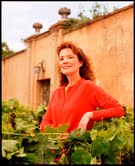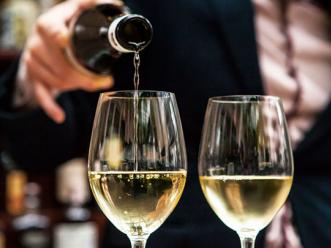 Karen MacNeil, one of the foremost wine experts in the United States, has had a long and creative career in wine as an educator, consultant, television host, and writer. She is the author of the award-winning book, The Wine Bible, and host of Emmy-award winning Wine, Food & Friends with Karen MacNeil; the first television series on wine in the United States. Karen is the creator and Chairman of the Rudd Center for Professional Wine Studies at the Culinary Institute of America in the Napa Valley. She conducts customized wine education seminars nationwide for individuals and corporations including American Express, Lexus, Merrill Lynch, General Electric, Time Inc., and NBC, among others. In 2008, the International Wine and Spirits Competition awarded Karen the “Oscar” of wine: Communicator of the Year. In a full page profile featured in Time Magazine, Karen was described as America’s “Missionary of the Vine.”
Karen MacNeil, one of the foremost wine experts in the United States, has had a long and creative career in wine as an educator, consultant, television host, and writer. She is the author of the award-winning book, The Wine Bible, and host of Emmy-award winning Wine, Food & Friends with Karen MacNeil; the first television series on wine in the United States. Karen is the creator and Chairman of the Rudd Center for Professional Wine Studies at the Culinary Institute of America in the Napa Valley. She conducts customized wine education seminars nationwide for individuals and corporations including American Express, Lexus, Merrill Lynch, General Electric, Time Inc., and NBC, among others. In 2008, the International Wine and Spirits Competition awarded Karen the “Oscar” of wine: Communicator of the Year. In a full page profile featured in Time Magazine, Karen was described as America’s “Missionary of the Vine.”
What prompted you to pursue a career in the wine industry? If not wine, where do you think you’d be right now?
I always loved flavor…even as a child, my favorite activity was cooking. I began as a food writer (after 324 rejection slips, my first article sold to the Village Voice when I was about 20. It was on butter, and I got paid $35). Later, after being a successful food writer, I turned to wine. If not wine…I would probably be a novelist or anthropologist.
Have you been surprised at the success of The Wine Bible, and has it accomplished what you originally had in mind?
I am very surprised. I thought I would sell about 100 copies. The Wine Bible has sold half a million copies to date. But yes, it did accomplish what I hoped…to make wine easy to understand and engaging to read about.
Is the role of the sommelier, and/or wine educators over rated in today’s wine savvy public?
No. The culture of wine in America is just now taking off. We need educators and sommeliers more than ever.
What wine varieties and/or regions would you like to see the public embrace more fully?
California sparkling wine, and Southern Spanish reds. Southern Italian reds and German wines in general. Australian Rieslings.
Much has been written and debated concerning the 100 point rating scale. Has it empowered consumers? Has it has distorted wine prices; has it actually changed the quality of wines being produced? What do you see as the long term impact of the 100 point rating system and is there a better way?
However flawed one might think the system is, it definitely has raised excitement and awareness about wine. However it has also motivated many wine regions that had been resting on their laurels. I myself have never used the 100 point system, but I think there have undeniably been benefits to the industry.
Rising wine alcohol levels in U.S. and foreign wines are constantly being debated. What are your thoughts on the subject?
Yeasts are better at converting sugars to alcohol. Wines are being made in places that are getting warmer. Ripeness is aesthetically appreciated now more than ever and softness (texture) is loved by the public. It all adds up to wines higher in alcohol.
As a speaker at many wine events, what is the question you are asked most often, and how do you respond to that question?
The question I am most often asked is how I learned so much about wine.
The answer is discipline and practice. I routinely taste about 3,000 wines every year and have for the past 30 years.
Do wine writers, wine magazines and wine blogs commit a disservice to consumers by over-rhapsodizing about intricacies in wine most consumers don’t care about? (yeast strains, volatile acidity, clone selection, etc.) Or is the minutia about wine nonetheless important to their wine understanding and enjoyment?
Both. The key is this: who is the audience? There are audiences with whom I would never utter a term like malolactic fermentation, and audiences with whom I always talk about it.
You have received a number of high profile accolades, what was the most important to you personally and why?
“Communicator of the Year - 2008” by the International Wine and Spirits Organization in London. It’s awarded to the person who best communicated about wine in the English language.
The week is over, you finally get home, what wine or wines does Karen MacNeil enjoy with family and friends?
Sparkling wine. I have a glass every night. I consider it the source of all patience and indispensable to motherhood.





